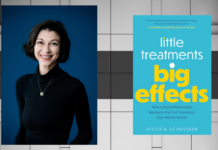I work as a writer. I am trying to find my place in Argentinean society, in South America, because I want to participate in cultural life with equal opportunities and conditions. But it is not easy for me. For example, when journalists interview me, they don’t ask about my work, as they would do with other writers, but about the psychiatric diagnoses and treatments I have suffered due to involuntary hospitalizations.
In Argentina, there is quite an advanced legislation on human rights that protects people that are labeled with psychiatric diagnoses. However, society takes its time restoring rights that were violated. In my creative processes, I need access to my voices and visions. Psychiatry described my creative processes as delusions and hallucinations, I was drugged for many years of my life and lost many years that I will not be able to recover — years in which I had to dedicate a lot of time to all kinds of mental health therapies. Finally, I realized that my schizophrenia was not a disorder, but a very complex problem that I could solve by myself. Gradually, I began to identify in which circumstances occurred what medicine referred to as symptoms of a mental disorder.

Environments where there is disharmonious noise become expelling places for me. I have to leave a place where there is noise. For example, if I am invited to give a lecture and I have to travel by plane, I have to wear ear protection to protect myself from the sound of the airport loudspeakers and wear dark glasses to avoid flickering tube lights. I try to maintain relationships with other people through my books, workshops or activism, even though I find it very difficult. Although I find it very difficult to relate to other people or to carry on a conversation in a neurotypical way, I learn a lot when readers give me feedback about my books. I always appreciate the intellectual honesty of my readers.
In the 22 years that I underwent mental health treatment, I made a discovery that was eye-opening for me. I already had information about my schizophrenia that therapists did not have access to.
According to the “International Convention on the Rights of Persons with Disability” definition established in 2006, disability arises from the interaction of a person’s impairment with social barriers. With this definition, disability necessarily involves an impairment. One might think that a person who hears voices that other people do not hear, is simply a person who hears voices and does not have an impairment, i.e. they lack nothing. But, in my personal experience, during my 22 years of mental health treatment I have not encountered any professional who acknowledges that hearing voices is simply just another characteristic of a person such as having dreams or nightmares.
My discovery came after much writing and reading about the forms that schizophrenia took in my life. At some point, I realized that it was not a mental disorder, but that my schizophrenia was a state that I could enter and leave without exposing myself to the risk of being institutionalized.
This way, I learned something that may seem very simple but was very complex for me: to identify the social barriers that make me very nervous and may lead me to have a psychotic break in places where I am at risk of being institutionalized against my will. I discovered that these situations are situations of disability, in which my difference in the face of social barriers is expressed as a psychotic break. Ultimately, I realized that I needed to create the necessary conditions to access my right to write my books, publish them, present them, and sell them. People with disabilities have fewer opportunities to participate in cultural life because there are social barriers that create accessibility issues.
Social barriers can be physical, cultural, communicative, or environmental. In the case of a writer, for example, psychopharmacological treatment can be a communicative barrier for him to express in his texts what he sees in his visions and what he hears in his voices. I find it much easier to write what my voices dictate and what my visions show now that I am not on medication than when I was on psychiatric drugs as prescribed by my doctor.
So, what social barriers might a disabled writer face? Generally, these are barriers in other people’s attitudes that infantilize, victimize, or glorify the process a person goes through when changing psychiatric drugs for hearing protection. Over the years with the support of my crazy friends, I recognized my impairment as a difference. It was thanks to my voices and visions that I understood that my disability is a condition that will cease to exist when people stop considering the ones who hear voices and have visions to be dangerous.















Fantastic story! This gives me great hope and courage. My favorite part was “I learned something that may seem very simple but was very complex for me: to identify the social barriers that make me very nervous and may lead me to have a psychotic break in places where I am at risk of being institutionalized against my will. I discovered that these situations are situations of disability, in which my difference in the face of social barriers is expressed as a psychotic break.” If the writer is open to questions, i would love to know two things:
1) Is your primary written and spoken (outer) language English or Spanish and what language are your inner voices? I ask because my daughters primary, outer language is English (she is bi-lingual English/French) but one of her most friendly inner voices has the intonation of Chinese, even though lingistically, it loses much in the translation and comes out as gobblety-gook.
2) What role, if any, did family members play in your recovery in the sense of helping you stay out of institutions? In my experience, we had to learn to stop freaking out every time our daughter behaves strangely. In the very beginning, we, her parents were the ones driving her to the hospital. It was our fear that led her to be institutionalized in the first place.. Now, a more common scenario is we, her parents attempting to dissuade her from wanting to to go back to the institutions which violated her sovereignty so deeply.
Report comment
Hi madmom, good morning. Nice to meet you.
1) The language of my voices varies according to the linguistic context.
2) It is very difficult to me to talk about that question in this comments, because it is a very personal question to meake it public. I am sorry. I just can tell you that I wrote a chapter about this matter in my book “El cuerdismo” (the sanism), that is only edited in Spanish.
Report comment
I hope there will be a Spanish translation of your book soon!
Report comment
” But, in my personal experience, during my 22 years of mental health treatment I have not encountered any professional who acknowledges that hearing voices is simply just another characteristic of a person such as having dreams or nightmares.”
Psychiatry is a marxistic tool to normalize things that means a lot more than marxism itself- materialism. Marxism is not psychological, like monism ( spirituality or empty materialism). So psychiatry does not see the necessity of pathology, like voices or sufferring. Psychiatry is based on monistic ideologies, not on understanding the pathological role of the psyche. Monism confused spiritualism with psyche, because spirit is easy. The proper psychiatric care would be if psychiatry gave meaning to voices, suffering and so on. But as a tool of empty materialism, they – empty materialiststs – want to get rid of those. This is psychopathy.
There is no substantive connection between psyche and psychiatry. Normalization, unification is not help or proper psychological care. Normalcy only gives the meaning to pathology, normalcy itself means nothing. Nominalism is a main sin of psychiatry. And psyche ( psychological identity) is not a branch of medical empiricism.
—————————————————————————————–
James Hillman “Re-visioning psychology”.
Report comment
I am not specifically speaking to this article writer as go forth to air some things that came up for me just now.
In my opinion there is not just schizophrenia but degrees and severities of schizophrenia. One person can have gorgeous visions and supportive and guiding voices, another person can wish to end their own life because the hallucinations and delusions are so horrendous. One in twenty people with schizophrenia kill themselves.
ONE IN TWENTY
It is a horrible illness for millions that gives the sufferer no peace. My own illness had many years where I felt like a world saving visionary, and I got into trouble for thinking myself that. I know full well the exhilaration of living as a visionary. It is beautiful and who would not want that. But for many with the severe forms of schizophrenia it is perhaps a cruelty to expect them to “shape up” and “think their way better”, as if they are lazy or attention seeking or malingering. That seems a throwback to the punitive ice baths of yore. Not all schizophrenics are “identical”. Not all cancer sufferers are “identical”. What works for one may be a rotten idea for someone different. I am FOR all schizophrenics being offered only the help that THEY as unique individuals want. Is that “FOR” really too much to ask after all these awful decades. It means there ought to be NO blanket assumptions about ALL schizophrenics. Some may happily get better on nothing more than a jotter and a glass of juice. Some may get better on preferring to work with voices that may not be telling them to kill themselves all day. Some may get better on regarding their illness as just but a dreamstate. I myself am currently experimenting with this. But I would not be for telling other schizophrenics or voice hearers or whatever the term is these days that their own unique ailment is gonna be fixed by writing a few chapters or merely seeing oneself in a whole new way. I have been a writer for decades. It does not ease my hallucinations and delusions. And calling myself a visionary did not heal me.
These days I am BOTH a visionary AND a very ill schizophrenic. I feel it is possible to have a unique brain that has BOTH wellness and illness within it.
I wish this article writer all the very best on his own voyage of discovery. I am all FOR hearing of success stories. I am all FOR hearing from the tired of hearing of those. BOTH contain valuable TRUTH.
That’s me…not looking for a riposte. Life is too short.
Report comment
Mr. Robinson, thanks for this explanation of your experience. It is validating to hear someone else working creatively with a similar complex problem as me. It is complex isn’t it!? And it does help me to believe that part of the problem is not inside me, but inside the culture and it’s own fears and limits. I also finally adapted my entire life to fit my physical and mental rhythms, and found a person or two who can roll with the differences. Usually they are doing the same out of necessity. The conflict cannot be inside my own mind anymore: questioning if I am too different or in need of fixing. I have decided that I am this way and it has some meaning and purpose and I will keep going as-is.
Report comment
It was compelx to me for several years, but when I saw the Film “A beuatiful mind” a reveltaion come over my in the scene I described in the article. regards
Report comment